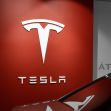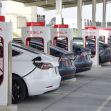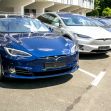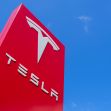Several California Tesla owners have filed a lawsuit against the electric car company accusing them of inflating the driving ranges of some of its models and establishing a system that ignored customer complaints.
The lawsuit was filed in the U.S. District Court for the Northern District of California and is seeking class-action status. The plaintiffs are seeking undisclosed monetary damages and a court order that would prohibit the automaker from “falsely advertising the estimated ranges of its model vehicles.”
The lawsuit is backed by a recent Reuters report that investigated Tesla's practice of exaggerating drive ranges in its advertising as a means to boost sales. As a result, the plaintiffs accused the automaker of misleading them into purchasing vehicles that did not live up to expectations. The plaintiffs say had they known the true driving ranges of the vehicles, they either would have not paid for them or would have paid less for a Tesla vehicle.
Tesla has billed itself as the industry leader in electric powertrains and drive ranges. In a report published by Car and Driver, four Tesla vehicles were ranked among the Top 10 longest-range electric cars for 2023. Tesla was the first automaker to have more than one vehicle named in the list.
The lawsuit is largely supported by a recent report published by Reuters. The Reuters report examined mounting claims of substandard drive ranges offered by the automaker.
Electric vehicle drive ranges swap out fuel efficiency found in gas-powered vehicles and are one of the most critical factors drivers use when determining which electric vehicle to purchase. Some of Tesla's most popular vehicles tout a driving range of 350 to 400 miles on a single charge. However, one driver highlighted by the Reuters report was able to get a little more than half of the advertised driving range from his Tesla when he took a road trip from Colorado to California with his new Tesla.
The lawsuit explains Tesla had an “understanding that this would be an important feature (if not the most important feature) to many customers” and that the company was “preying on this fact.” The lawsuit adds, “Tesla marketed its electric vehicles as having a grossly overvalued range in an effort to increase sales numbers.”
The Reuters report also highlighted Tesla's recently created “Diversion Team.” The purpose of this team was to take calls related to vehicle performance and dispel driver concerns. Often customers were told that there was no issue with their battery and they were eventually redirected to have their service appointment canceled. The Diversion Team was reportedly established as a way to manage the inundation of calls related to driving range issues.
By canceling customer service appointments related to driving ranges, Reuters reported that Tesla saved an average of $1,000 per call.
This lawsuit is not the first time Tesla has been accused of exaggerating its driving ranges. Earlier this year, the South Korean government fined the electric automaker $2.2 million for exaggerating driving range by as much as 50%.
Aside from driving range inaccuracies, Tesla has also been at the center of other complaints regarding fickle warning lights, steering wheels that come off while driving, and unexpected and unnecessary failure of Tesla parts. Earlier this year, at least 15,000 Tesla models were recalled because of faulty seat belts. There were also concerns the year prior about Tesla's autopilot system after a number of vehicles were involved in car accidents when the system was engaged.
The plaintiffs are represented by attorney Adam Edwards. Edwards explains in the lawsuit, "Driving range on a single charge is undoubtedly a key feature that EV consumers rely on in the purchase decision.” Adams adds, "Tesla’s decision to create a team to divert range-related complaints and cancel service appointments is unacceptable. Put simply, Tesla has a duty to deliver a product that performs as advertised."






